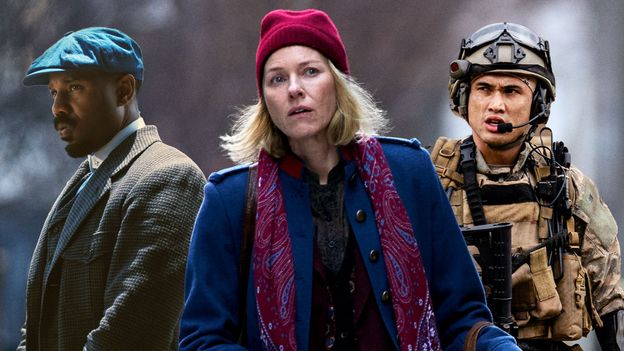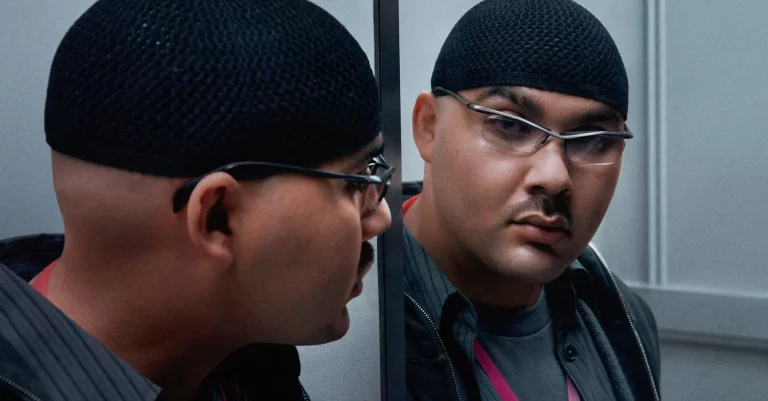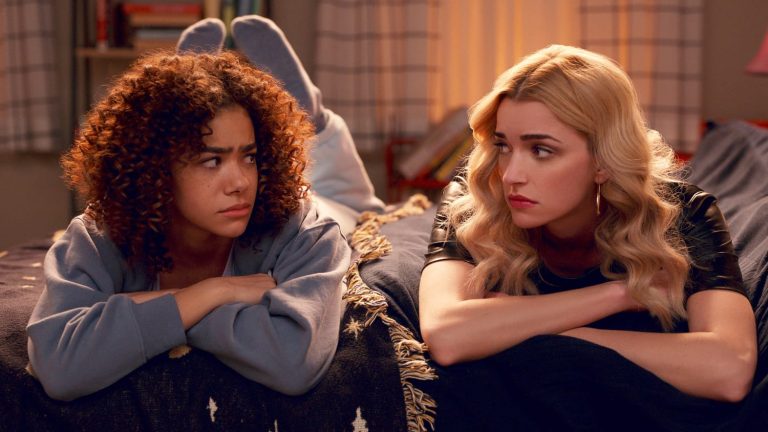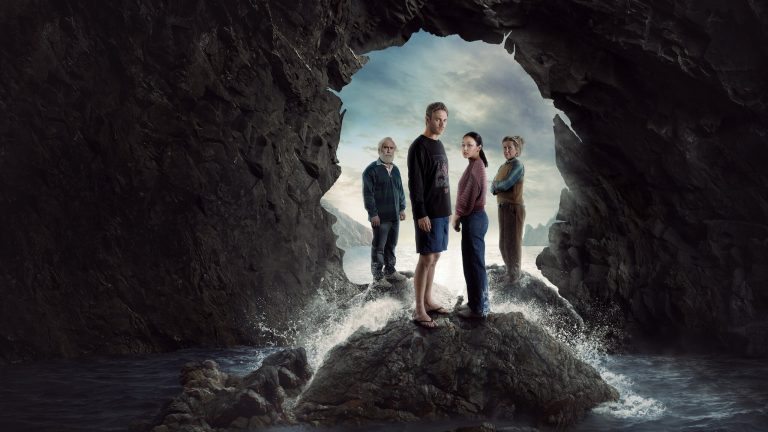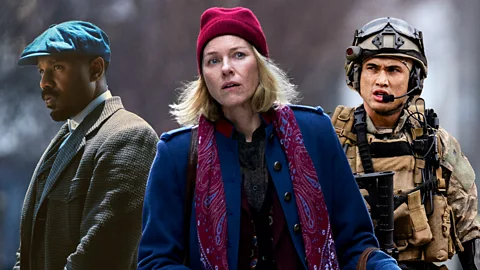 Yun Sun Park/ BBC
Yun Sun Park/ BBCBBC film critics Caryn James and Nicholas Barber pick their cinema highlights of the year so far, from a brutal war epic to an ambitious period vampire drama.
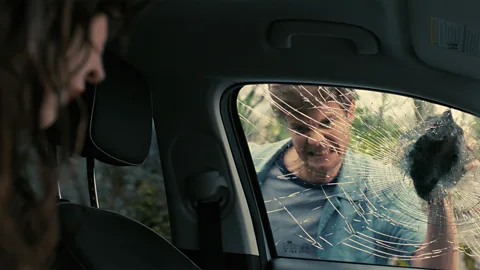 Warner Bros Pictures
Warner Bros PicturesCompanion
The sharpest American indie film of the year so far, Companion stars Jack Quaid and Sophie Thatcher as a devoted young couple who go to stay with some friends in a Russian tycoon’s remote forest getaway. (Rupert Friend has a hilarious cameo as the mulleted oligarch.) As a drunken evening of confessions, suspicions and disagreements unfolds, it seems at first if the film might be a romantic comedy, or maybe a noirish thriller about a robbery gone wrong. In fact, Companion is a science-fiction comedy thriller – but beyond that, the less you know about the film in advance, the more enjoyable its many ingenious twists and turns will be. Suffice it to say that the big-screen debut of writer-director Drew Hancock is a sparklingly entertaining satire on modern technology and the never-more-relevant topic of how entitled and misogynistic certain insecure young men can be. And it packs all of its ideas into 97 minutes. (NB)
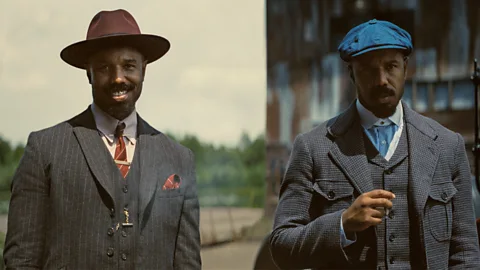 Warner Bros Pictures
Warner Bros PicturesSinners
As stunning as Ryan Coogler’s Black Panther was, he has outdone himself with Sinners. Michael B Jordan is slyly convincing as twins named Smoke and Stack, who return from Chicago to their home town in Mississippi, in the Jim Crow South in 1932, to open a juke joint. With huge ambition and imagination, Coogler swirls familiar genres and tropes into a wholly original film that blurs the real and the supernatural. Sinners is a period piece as well as a vampire film. It is a drama about racism, family, superstition and spirituality, and it comes with passionate sex and exhilarating blues music. Coogler directs with brio, at times creating a phantasmagoria in which robed African musicians appear next to rappers. The first hour is so full of texture it could stand alone as a period film, but the supernatural eventually intrudes, leading to a finale of action, blood and vengeance. Jordan is surrounded by a superb supporting cast, including Delroy Lindo, Wunmi Musaku and Hailee Steinfeld. Sex, blues and vampires at the door? What more can anyone want from a film? (CJ)
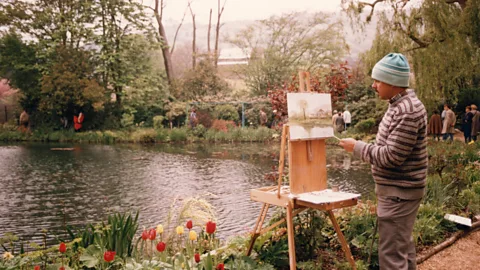 Cozy Cottage Films, LLC
Cozy Cottage Films, LLCArt for Everybody
Miranda Yousef’s riveting documentary tells the stranger-than-fiction story of Thomas Kinkade, one of the biggest-selling artists in history. Critics dismissed his work as nauseatingly sickly, but in the 1990s and 2000s, there were shops all around the US devoted to Kinkade’s sentimental pictures of cosy country cottages. Art for Everybody asks fascinating questions about who gets to decide what counts as legitimate art, and whether some paintings can be more moral than others – questions that resonate today, in light of the continuing culture wars in the US . But Yousef’s delicately balanced and sensitive film is just as fascinating on personal issues as it is on sociopolitical ones. A key part of Kinkade’s marketing was his carefully constructed public image as a devoutly Christian, all-American family man, and yet the so-called “Painter of Light” had a dark side, too. Did the pressures of being a squeaky-clean Dr Jekyll push him into becoming a self-destructive Mr Hyde? (NB)
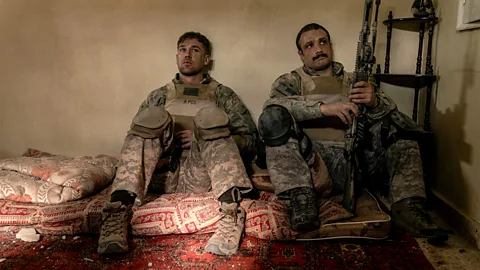 A24
A24Warfare
Alex Garland, the writer and director of Civil War, and Ray Mendoza, a veteran who was that film’s military advisor, have created a harrowing, visceral, real-time drama that recreates an actual battle between Navy Seals and al-Qaeda jihadists. Garland’s virtuoso technique and Mendoza’s first-hand experience of war blend in a film of uncompromising focus, which plunges us into the intensity of combat without explanation or backstory. Yet the faces of Joseph Quinn, Will Poulter, Cosmo Jarvis and D’Pharaoh Woon-A-Tai are enough to capture the fear and determination of being under siege. Creating characters far from the bravado of typical Hollywood war films, the actors depict courage in battle as a terror-filled endurance test. The film immerses us in that feeling. It is loud and intense, relentless in its barrage of grenades and gunfire, and when the cries of pain from the injured men start, they never stop. Warfare is a dazzling technical achievement but much more. Focusing on the personal cost of combat and violence itself rather than the politics of the Iraq conflict, it reinvents the war film with bracing freshness and immediacy. (CJ)
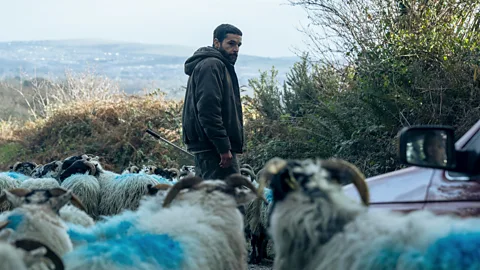 MUBI
MUBIBring Them Down
Barry Keoghan, Christopher Abbott and Colm Meaney star in this dark and bloody western-style thriller about a feud between sheep farmers in remote rural Ireland. Meaney and Abbott (who speak their dialogue in Irish) play a laconic father and son who lose their two prize rams, only to discover that they have been stolen by their neighbour’s shiftless son (Keoghan). Accusations are made, simmering resentments reach boiling point, and violence ensues – but then Christopher Andrews, the film’s debut writer-director, rewinds his story and replays it from a revelatory new perspective. Suddenly, a hard-boiled story of crime and retribution becomes an aching tragedy about desperate economic hardship, youthful stupidity, male pride, and the traumas passed down from taciturn fathers to taciturn sons. Bring Them Down is tough to watch but it’s beautifully shot, cleverly plotted and stunningly powerful. (NB)
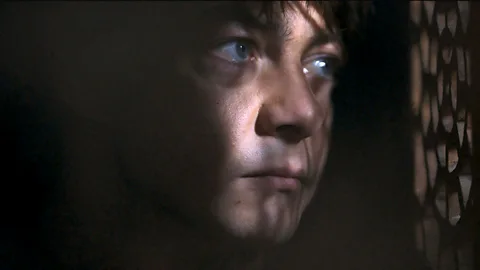 TIFF
TIFFMisericordia
Alain Guiraudie’s (Stranger by the Lake) engaging film is full of surprises. It starts as a drama about Jeremie, a young man returning to his small village in the lush French countryside for a funeral, then becomes a quietly comic take on desire along with a thriller about covering up a murder. The film deftly carries the audience with it through all these turns. Jeremie is an opportunist but also an enigma. He may have had a passion for his former boss and mentor, the village baker, who died. The baker’s widow definitely seems interested in Jeremie, who grew up as the best friend of her son, Vincent; he now angrily suspects Jeremie of wanting to sleep with his mother. Jeremie does not want that but he does find himself in a reluctant affair with the local priest. The joke is that so many people lust after the unremarkable Jeremie, and the suspense comes from the small-town eyes and local police wondering what happened when Vincent mysteriously disappears. Misericordia (Latin for mercy) was nominated for eight Cesar awards, the French equivalent of the Oscars, including film and director, but its human comedy lands easily with audiences everywhere. (CJ)
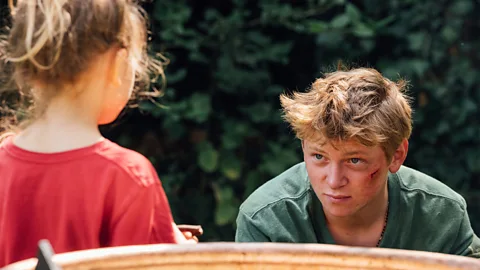 Agat Films
Agat FilmsHoly Cow
Deep in the leafy French countryside, a scruffy teenage layabout Totone (Clément Faveau) has to look after his younger sister Claire (Luna Garret) after the sudden death of their father. His answer to their dire financial problems? Making award-winning luxury cheese. Louise Courvoisier’s debut film is a heart-tugging coming-of-age drama, rooted in the soil of the Jura region where she grew up. She offers an earthy insider’s view of how strenuous life can be for agricultural workers, and how wrenching it is when carefree youth turns to relentless, responsible adulthood. But she also fashions a warm, romantic, gorgeously scenic and ultimately hopeful tale of underdogs working together in the sunshine to improve their lives. Blessed are the cheesemakers, as Monty Python once put it. (NB)
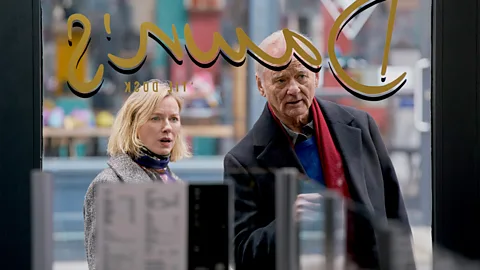 Bleecker Street
Bleecker StreetThe Friend
A giant, sloppy Great Dane tugs Naomi Watts around the streets of Manhattan, but by the end of this lovely film about affection and grief the physical comedy with the dog seems the least of it. Watts smoothly play Iris, a creative writing teacher whose best friend, Walter, a famous womanising author, kills himself. He leaves her his dog, Apollo, even though she lives in a one-room apartment in a pet-free building. Dealing with Apollo becomes a way for Iris to grapple with her feelings of love and loss for Walter, played by Bill Murray in flashback scenes filled with such wit and tenderness that they have a great impact in spite of his minimal screen time. Based on Sigrid Nunez’s eloquent, acclaimed 2018 novel, the film was directed by Scott McGehee and David Siegel, whose films include the underrated Montana Story (2021) with Haley Lu Richardson and Owen Teague. Avoiding mawkish clichés, they have created a gem of a film that is funny and touching whether you are a pet lover or not. Come for the rambunctious Great Dane, stay for the beautifully rendered emotions. (CJ)
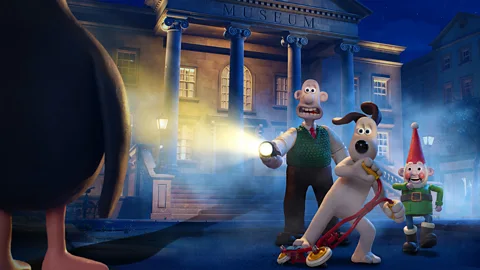 BBC/ Aardman Animations
BBC/ Aardman AnimationsWallace & Gromit: Vengeance Most Fowl
Aardman’s two greatest heroes are back – and so is their sneakiest ever adversary, a diabolical penguin named Feathers McGraw. Directed by Nick Park and Merlin Crossingham, the Oscar-nominated Vengeance Most Fowl is chock-full of the qualities that make Wallace & Gromit’s farcical adventures so cherished: the painstaking stop-motion claymation, the Heath Robinson-style gadgetry, the winking homages to classic cinema, the gleefully silly British humour, and the deep affection for the characters and their world. Above all, it a treat to see Feathers McGraw, more than 30 years after he was introduced in The Wrong Trousers. But there is more to the Bristol-based studio’s new film than the nostalgic whimsy you would expect. When Wallace invents a robotic garden gnome that does all of Gromit’s favourite gardening jobs (and that’s even before it turns evil), the story takes a canalboat trip into Mission: Impossible territory by addressing fears about artificial intelligence. (NB)
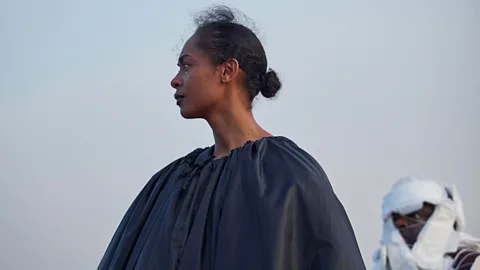 A24
A24On Becoming a Guinea Fowl
The immensely talented director Rungano Nyoni, whose I Am Not a Witch (2017) won a Bafta for outstanding British debut, makes artful, accessible films of great visual panache. Her latest is a clear-eyed drama about cultural and generational conflict. The heroine, Shula, is a cosmopolitan woman recently returned from the city to her village in Zambia. Nyoni conveys this dissonance at once, as Shula drives home from a costume party dressed in a glittery silver helmet and dark glasses (an homage to a Missy Elliott video) and finds her Uncle Fred dead on a dirt road. As the story takes us into the family’s traditional funeral rituals, it slowly reveals that Shula and two cousins had been abused by Fred as children, a reality their mothers put aside as they mourn their brother. Nyoni’s style is realistic even as she drops in surreal images. The narrative about secrecy and the trauma of sexual assault builds in power right to the end, when Shula recalls a children’s television programme and the title of this stunning film finally makes sense. (CJ)
